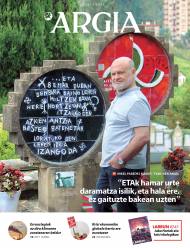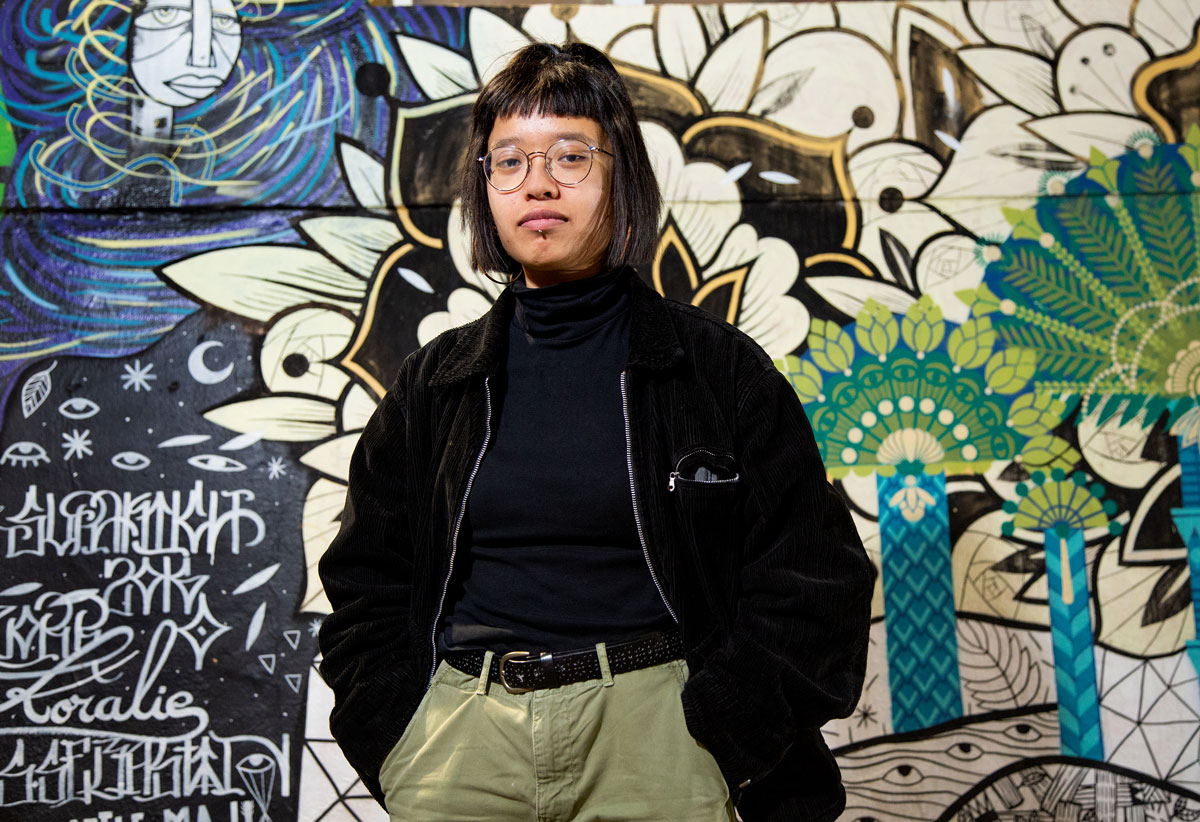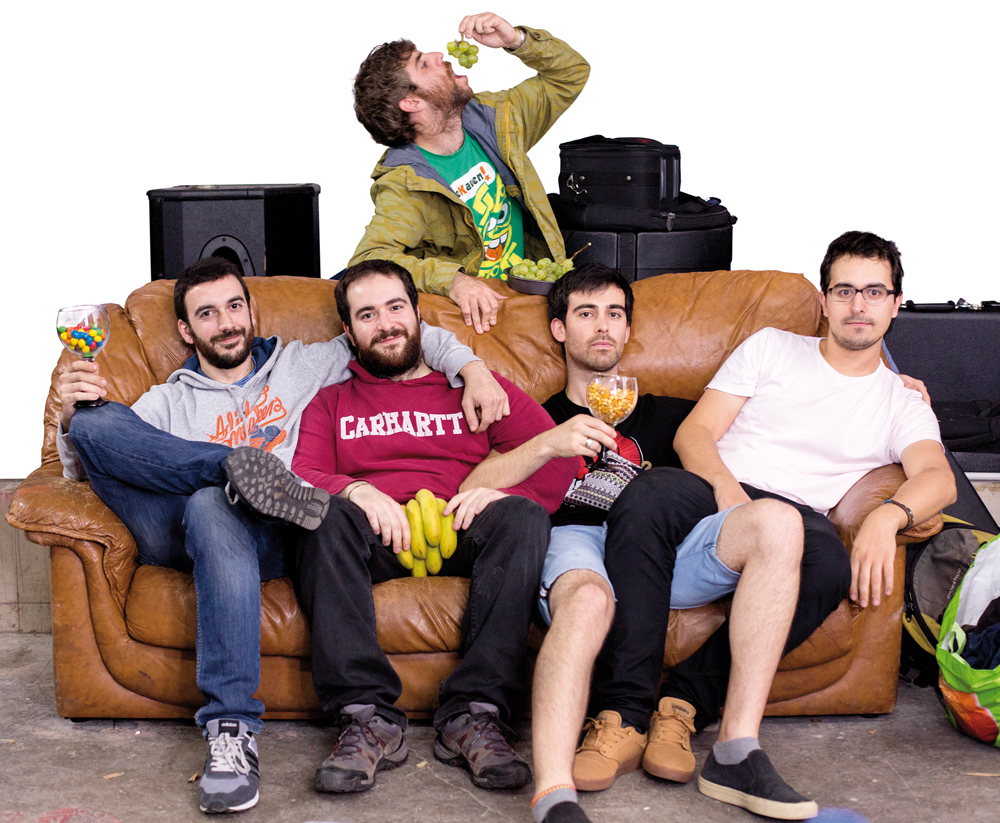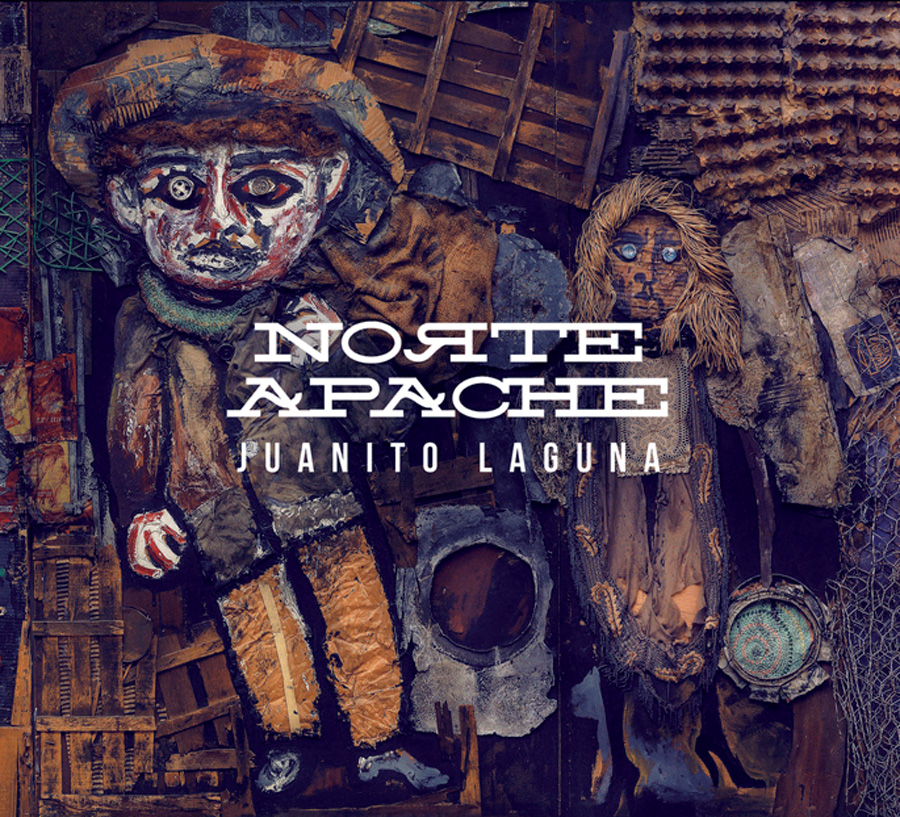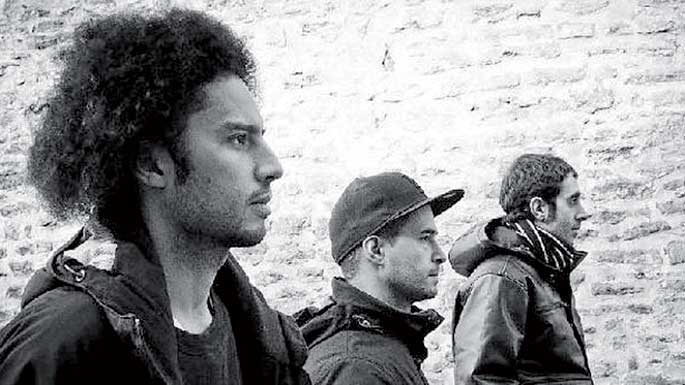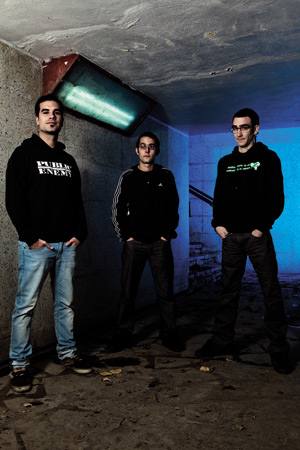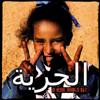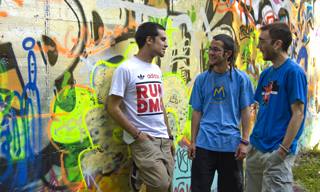"The Fatherland Fuck, long live the Basque"
- Gangsters, drugs and mafias are everyday in the universe of Arrano Percha and Lengu Iluna. The word “Zipaio” is being sung from an independent Basque Country that does not exist: “The Navarros on the coast are like this, drug addict players always criminals.” They claim that the Basque rap was born with them, dressed in a t-shirt that presents Mikel Goñi as “original gangsta”. Your first album is last year's: God was money and the old rhythm.
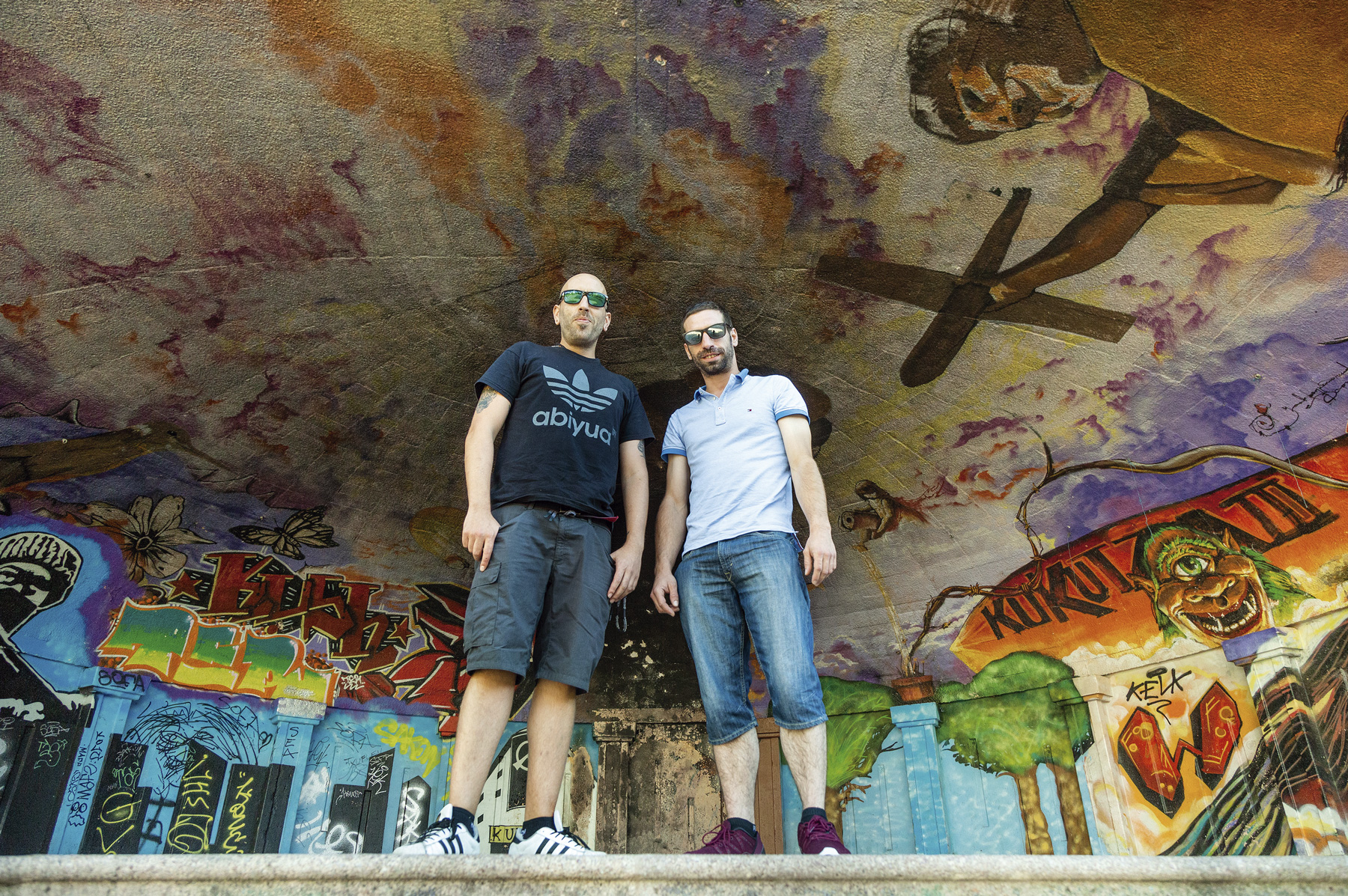
The concrete kiosk of Plaza Rekalde has graffiti the history of the neighborhood: working-class struggle, pictures of prisoners, Kukutza III. Urko González (Arrano Pertxa) and David Rodríguez (Lengu Iluna) have stood in front of the camera and a girl has approached the non-electric patio: “This is not a very touristy place, eh!” Behind the kiosk is the football field and in front of it a café with terrace: space for conversation. “We are in Bilbao, but this is an exceptional thing, almost a town,” says González, “here we have always had mudslides, outpatient with a Christ, terrible scandals to put the bus line… Imagine that those of Corpus Christi crumbled. They were telling us. This is a real ghetto!” Always in the hip-hop world, they've known each other for a long time, but they've never worked together before embarking on the project. “We are a machine, we adapt very well when we start working.” By relay, they spoke with great delicacy.
Where did “Arrano Pertxa eta Lengu Iluna” come from?
Arrano Pertxa: I never had to sing in Basque. I think of Spanish. But I knew that if I ever sang in Euskera, I would do something really bad. Nothing like what I sing in Spanish – I look for more poetic images or more beautiful melodies – nor that kind of rap that has always been done in Euskal Herria. It had to be something else. If ever a young baserritarra from a lost town in Navarre tells his adventures, that will be the rap that I will like. But since nobody had, I thought: “This is the time.” And right at a time when I've started to fall in love with the old rap again.
Dark Tongue: I don't know anything in Basque, but it doesn't matter, the letters are from Arroso and then he returns them to me. That's the part we love the most.
And what is that kind of rap that has always been done in Euskal Herria?
A.P. : Well, I had rap bases, people were raping, but in the background it was pop. The traditional message that is sung in Euskal Herria has become rap – instead of reggae, punk or rock – the formula of always in another genre. Political message music has been pop here. And those songs didn't convey to me what some of the American, French or Spanish raptors transmit to me. It's a matter of attitude: I'm here in the world, no matter what I say, I say what I want and I want you to hear me. That's why I have that attitude, because I want to be heard.
I.T. He said to me: “We have to do what Much-Lad does, but in Basque.” I understood instantly. We have tried, and I think we have succeeded.
You sing to the drug, to the mafia, to the money, to the gangsters… how much does the Bilbao of 2019 have of ghetto?
A.P. : Everything has a fictional point. The world of the eagle is fictional, but I can’t separate myself from my hand… Rap has to create an aesthetic. It would be terrible for me, for example, if someone who doesn't know Euskera reminds us of the anglerfish of the '90s when they listen to us, it doesn't matter what they say and what they don't, that the integrity of the work has a character -- samples, scratch, whistling shouts, and other characteristics of the genre.
I.T. : What we do now is not done by anyone, either in Spanish or in Basque. Now everyone traps. This is the eternal hip-hop. We're making a jump of two or three generations.
"In Euskal Herria we are musically backward, because three generations have heard Eskorbuto, La Polla Records, Kortatu… That is very heavy"
Arrano Pertxa
A.P. : Of course, sometimes we force ourselves a little bit to phrases, but we use that language to look for an aesthetic. When you write a story, it's not about whether it's fiction or not, but whether you believe it. Tarantino is not a gangster, he is not even the son of Al Capone. But it's a kind of story that writes great and we love it.
I.T. However, you need to know what you're talking about. You don't have to be inside, but I don't traffic, but I know how it's done and what that world looks like.
A.P. : Well, our generation has grown up on the street, almost everyone has had contact with drugs, but in that world there was no Basque. We have also tried to correct a jargon from the street in Basque, and we have received a very good answer. Above all, of a sector that I did not expect: of the Basque rappers. I was curious about what people would say, how we would get the picture, but most of them really liked it, many others, and there are some – and that makes me sad – who catch us as if we were joking. But no, it's about looking for an aesthetic and staying in your home until you find it. It doesn't matter what you say. Rap, rap and rap. Rap to the end.

On the one hand, the influence of the anglerfish of the 1980s in the United States; and on the other, the “vasquity” is very present in your words. From Arrano Pertxa, references to the Basque symbolism and other references are continuous, if not direct.
I.T. : In addition, we project a utopian world. In the universe of the eagle, Euskal Herria is independent…
A.P. : There is one border in Karrantza, another in Lapubs of Labarca… that is the only universe that can pass. I don’t mention the word “zipaio,” which is why, in an independent world, one could not call “zipaio.”
But isn't it a little dystopian world?
A.P. : Yes, that world has great shortages. In one of the most recent songs, I say: “A cursed homeland, like everyone else.” As I said, Euskal Herria is another country, such as Moldova or Ukraine: great shit. That's it. We are Basques, yes, and what? I also have a nose and I'm not going around screaming, "Aupa sudurluze." The homeland Fuck, long live the Basque.
What is Mikel Goñi's place in this universe?
A.P. : Goñi's story is impressive. A real gangster.
I.T. : In the eagle world at least Tony Montana.
A.P. : It's even better: he was a professional athlete. If it was someone who has always been in that world, well, but he was on TV, he was stole the grass one day and… it was over. Maybe I thought nothing would happen to him.
"We project a utopian world. In the universe of the eagle, Euskal Herria is
independent” Lengu Iluna
Let's talk about you. They tell me that you manage to work very well together.
I.T. That's right. Every time we get together, we always end up making a base. We took a coffee and we went home. Urko always brings some samples, sits next to me all the time, and we start dividing samples, we go into batteries, then we go down... As long as I do the rhythm, he can rap something probial. And when you leave home, we already have the main idea finished.
A.P. : On the previous album, I first wrote the songs' titles. I knew the title they would take, and so I forced myself to write the words that corresponded to those titles. Normally the road is the opposite, but I wanted that, to have a real script. Money is the only way, if you have the title, you know you have to make a song about money. So we completed the work in a dozen months.
I.T. : On the other hand, we invented G-Folk, a concept based on funk G. We use different samples according to the intention: some are more funky, others more folkic. We have recently used Italian music from Calabria, for example. Yes, we always adapt it to our roll, putting a triki in and so on.
A lot of hip-hop groups are being created in Basque. Do you perceive that attitude that those of you did not have before?
A.P. : No doubt. I don't hear any rag, but I see people are very strong. Nizuri Tazuneri loves; some young people from Lekeitio –G.A.Z. Limbo – they have an incredible level, they are going to be very good; The Ercilla theater group I don’t interpret it as music [laughs]. And as for rap: Ziakhus, Buru Arin, Xsakara… people who have heard a lot of American rap and who are doing very good things. Why suddenly this boom? In Euskal Herria we are lagging behind musically, because three generations have heard Eskorbuto, La Polla Records, Kortatu… That is very heavy. Political conflict is forcing us to step back musically. I do not mean that bad music has only been made here, but that we have not gone at the same pace as the trends in the world. And so now a powerful rap is being created, because instead of ten years ago, there was no one to listen to rap before, because people wanted to hear the Basque radical pop. Today, the picture is changing.

Do you see that rap renaissance as a connection to the global boom of the trapa?
A.P. : No doubt. Today, a Yankee brings out a video, a second I'm watching, and if I want to do something like that in Euskera, I can do it tomorrow. And then, what I said: the political conflict changed the music, and we were left out of the trends of the world -- and that's neither good nor bad, but it happened. When did the first serious group of electronics appear in the Basque Country?
I.T. Well, there you have the Out of Here.
A.P. : I mean that: the first electronics team that's not an old shit, when is it?
I.T. : It was an irony, boy. The other day you could hear it at the Bilbao festivities.
Don't think that it was then spared the stigma of Hemendik At's electronics, even if the letters were explicitly political.
A.P. Of course! For me, it's about the way pop takes in every place: In the United States, pop revolves towards hip-hop; in Spain, in the 1990s, pop had a flamingo and rumba; and in Euskal Herria music has been pop to sing political messages.
What plans are ahead?
A.P. : This year we are taking a Single every two months. We've already pulled three, now tap another one, and the other two are almost finished. Well, then comes the record. I have four songs' titles thought [laughing]. I'd like to do something long, like fourteen songs. On the first album we have presented ourselves, on the second we would like to reach other sites. That is our way: to dispense with the politically correct filters, to rapture and to rapture.
Two hours before the presentation has come to assemble the multitudinous. “But, aber, it’s a rapeed guy and a DJ already has it and it’s done, right? What do they have to assemble here?” he thought of some totally incomplete brains. Much of the brain responds to that... [+]
“The life of a poor child is worth as much as that of another middle-class or affluent class.” The words of Vanesa Orieta, the last album by Norte Apache, Juanito Laguna, stole and assassinated his brother Luciano Arruga, 16, in Buenos Aires. From South America to Bilbao,... [+]
Iruñeko Katakraken ikastaroa antolatu dute musika beltzaren inguruan. Izen emateko epea zabalik da.
Batzuen artean : Bi herri, irrintzi bat.
Musikherria
Iraupena : 59´30´´
Prezioa : 5€







